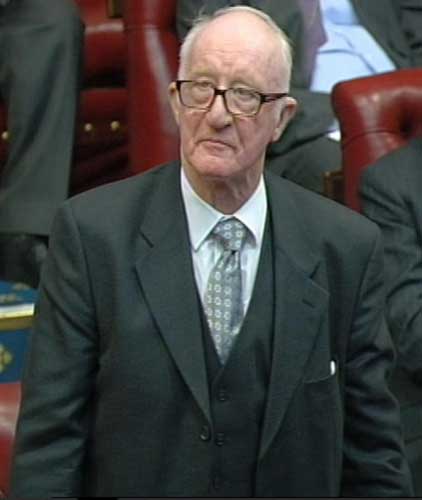'Rent-a-peer' claims put Lords reform back on the agenda
As extent of Lords sleaze is revealed, the pressure mounts for constitutional change. By Brian Brady reports

A Labour peer has been paid more than £600,000 from a firm owned by a Russian oligarch, it was claimed last night.
Former policeman Lord Mackenzie of Framwellgate was paid £616,000 by Inter TV between 2001 and 2006, according to a report in the News of the World.
The owner of the British-based company, Vladimir Gusinsky, fled Russia after falling out with Prime Minister Vladimir Putin and being charged with fraud. He has denied the allegations, insisting they were politically motivated.
In the Register of Lords Interests, Lord Mackenzie states he is a consultant to the firm, but the company's accounts confirm that he is actually a director of Inter TV.
Under anti-sleaze rules, peers are obliged to declare any paid directorships.
The claims come amid continuing fallout from the "peers for hire" affair, sparked last week when a Sunday newspaper claimed four Labour peers told undercover reporters they were prepared to change legislation in return for money.
The Sunday Times reported last week that four Labour peers – Lord Moonie, Lord Truscott, Lord Taylor of Blackburn and Lord Snape – had discussed amending legislation in return for a fee, which would be in breach of parliamentary standards. Despite his recorded boasts to the contrary, few admitted to knowing the former Paul Truscott until they read the piece – and later saw the secretly filmed footage of him apparently explaining to a pair of undercover journalists how legislation could be influenced .
The story was a re-run of a Westminster sleaze story which has appalled and entertained the nation for almost two decades. Only this time there were twists: first, it was exclusively Labour politicians accused of having their snouts in the trough and, significantly, their alleged misbehaviour was connected to the august surroundings of the Lords. Perhaps this was why Britain's political leaders – even the Prime Minister, Gordon Brown – felt able to use such fearsome terms while laying into the apparent lapses in standards. While Mr Brown spoke of emergency sanctions, David Cameron described as "pretty chilling" a recording in which Lord Taylor of Blackburn is heard boasting to an undercover reporter that he can earn up to £100,000 from a company for his work as a fixer.
The Leader of the House of Lords, Baroness Royall, swiftly announced the dual inquiries, conceding that the allegations have damaged Parliament and that its members must abide by the highest standards. The two Lords inquiries investigating an affair, dubbed "the vermin in ermine", are expected to push for strict new rules which would see colleagues thrown out of the Lords if they abuse their privileges. It is currently impossible even to suspend a peer from the Lords.
Alongside the Lords' own attempts at reform, Jack Straw, the Justice Secretary, is planning to use the affair to drive through changes in "key issues", including accountability and sanctions. A constitutional reform bill, to be unveiled before the summer, is seen as the most likely vehicle for the changes, senior Whitehall sources said last night. Mr Straw plans to discuss the changes with colleagues, including the Prime Minister, over the next few weeks, before embarking on more wide-ranging reforms after the next election.
Shock over the revelations was not confined to the force of the allegations themselves, but the realisation that, while MPs have been forced to clean up their act, the Lords has largely been left to its own devices. Not only is there a clear deficiency in the sanctions available to punish misbehaving peers, but there has also been a disturbing failure to monitor their business dealings. In the aftermath of the weekend's claims, it emerged that one in five peers is now undertaking consultancy work for outside clients. Although taking such positions is not outside the rules, the sheer number of contracts – and the amount of cash involved – raises the potential for abuse in a chamber that is becoming more important due to the sheer amount of legislation and the shortage of time to process it. Along with rumours of peers attempting to amend legislation for cash, there are now stories of Lords using parliamentary facilities to entertain business contacts.
Tory grandee Lord Strathclyde described the allegations as "deeply shocking", adding: "This House has been mired in a grim torrent of criticism about a culture of sleaze.... There are no grey areas in the paid advocacy rule. It could not be clearer."
What is not clear, however, is who his colleagues blamed for the affair. For the moment, many peers have chosen to close ranks around their colleagues while waiting for the next accusation – despite particularly embarrassing tapes of Lords Truscott and Taylor in conversation with undercover reporters. Lord Harris of Haringey, one of those targeted by the "sting" but who refused to respond to the questions, chose to rail against the "entrapment" and "deception" of the journalists involved.
Join our commenting forum
Join thought-provoking conversations, follow other Independent readers and see their replies
Comments
Bookmark popover
Removed from bookmarks